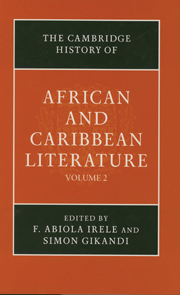Book contents
- Frontmatter
- 23 East African literature in English
- 24 Anglophone literature of Central Africa
- 25 West African literature in English: beginnings to the mid-seventies
- 26 South African literature in English
- 27 African literature in French: sub-Saharan Africa during the colonial period
- 28 North African literature in French
- 29 Francophone literatures of the Indian Ocean
- 30 African literature in Spanish
- 31 African literature in Portuguese
- 32 Popular literature in Africa
- 33 Caribbean literature in French: origins and development
- 34 Caribbean literature in Spanish
- 35 Anglophone Caribbean literature
- 36 The Harlem Renaissance and the Negritude movement
- 37 Postcolonial Caribbean identities
- 38 African literature and post-independence disillusionment
- 39 “Postcolonial” African and Caribbean literature
- 40 Modernism and Postmodernism in African literature
- Index
- References
26 - South African literature in English
Published online by Cambridge University Press: 28 March 2008
- Frontmatter
- 23 East African literature in English
- 24 Anglophone literature of Central Africa
- 25 West African literature in English: beginnings to the mid-seventies
- 26 South African literature in English
- 27 African literature in French: sub-Saharan Africa during the colonial period
- 28 North African literature in French
- 29 Francophone literatures of the Indian Ocean
- 30 African literature in Spanish
- 31 African literature in Portuguese
- 32 Popular literature in Africa
- 33 Caribbean literature in French: origins and development
- 34 Caribbean literature in Spanish
- 35 Anglophone Caribbean literature
- 36 The Harlem Renaissance and the Negritude movement
- 37 Postcolonial Caribbean identities
- 38 African literature and post-independence disillusionment
- 39 “Postcolonial” African and Caribbean literature
- 40 Modernism and Postmodernism in African literature
- Index
- References
Summary
Questions of boundary-definition and entitlement to the term “African” have been a feature of literary scholarship and the criticism it has produced on the continent since at least the 1960s. Those questions have not been superseded, as is evident from the continued currency in certain quarters of the term “Europhone” to identify imaginative literature by Africans in English, French, or Portuguese. But if such questions are characteristic of the field of African literary scholarship as a whole, they acquire a different kind of complexity in the South African context, with its peculiar history of far-reaching colonial settlement, industrialization, and cross cultural encounter. Part of that complexity can be discerned in the emergence of strains of African nationalism that have developed out of the repudiation of the prescriptive forms of ethnic identity inscribed in apartheid, prompting many writers of African origin to turn to English as the language most appropriate to their context and aspirations. To speak of African writing in English in South Africa, therefore, is to confront a situation for which prior debates in literary historiography on the continent provide little by way of an appropriate framework within which to begin distinguishing the various lines of development.
There is also the unsurprising fact that in South Africa itself there has been a lively debate over the literary historiography of the region, a debate conducted with only passing reference to the question of the place of South or southern African literature within the context of the literary production of the continent as a whole. The main question in contention is the desirability or otherwise of an integrated, indeed properly national literary history, in which the histories not only of black and white writing in the colonial or colonial-derived languages (English and Afrikaans), but also of writing in the indigenous languages – nine of which are now enshrined in the postapartheid constitution as official languages – might achieve collective recognition.
- Type
- Chapter
- Information
- The Cambridge History of African and Caribbean Literature , pp. 504 - 529Publisher: Cambridge University PressPrint publication year: 2000



